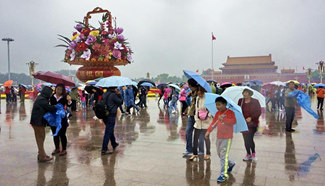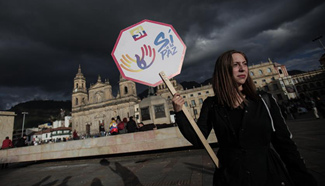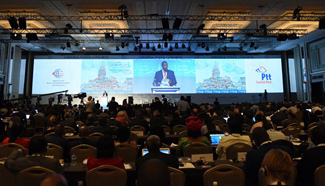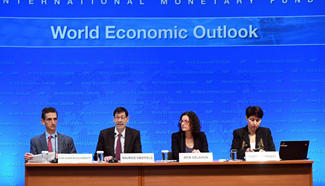DAMASCUS, Oct. 4 (Xinhua) -- The U.S. decision to suspend talks with Russia over restoring a ceasefire in Syria will further escalate the situation in the war-torn country and thus prolong the crisis, analysts say.
Analysts here in Damascus deemed the American decision, which was ostensibly based on Washington's frustration with Russia and the Syrian government, as a reflection to the lack of the U.S. seriousness in resolving the Syrian crisis, and bringing the bloodletting to an end.
A day earlier, the United States has suspended negotiations with Russia on restoring a ceasefire in Syria, blaming Moscow for its military role in the attack on the Syrian city of Aleppo.
Both Washington and Russia have traded blames for the faltering ceasefire efforts in Syria.
U.S. State Department spokesperson John Kirby said in a statement that Russia was "either unwilling or unable to ensure Syrian regime adherence to the arrangements to which Moscow agreed."
The spokesperson also accused Moscow and Damascus of targeting civilian areas and critical infrastructure such as hospitals and preventing humanitarian aid from reaching civilians in need.
While lamenting Washington's decision, the Russian Foreign Ministry charged that the U.S. was trying to shift the blame on Russia.
"Washington has simply failed to live up to the key commitment under the agreements -- to facilitate the humanitarian assistance to residents of the Aleppo city...(and) to apply pressure on the armed opposition groups," the ministry's spokeswoman Maria Zakharova said.
The suspended dialogue had previously resulted in a short-lived cessation of hostilities in Syria, which held for a few days last month, and was never renewed, after breaches had occurred, with both the opposition and the government forces trading accusations.
Mahmoud Muri, a Syrian political analyst, told Xinhua that "the diplomatic rift between the United States and Russia on the Syrian file, will only contribute to the continuation of the bloodshed in Syria," urging both countries to hasten to find a political settlement to Syria's over five-year-old conflict.
"The United States is apparently not serious about finding a political solution to the Syrian crisis, and that's evident by the escalatory rhetoric," he said.
Muri pointed out to the U.S.-led airstrikes on Syrian military positions in the eastern province of Deir al-Zour last month, which led to the killing of 90 Syrian soldiers and enabled the Islamic States (IS) militants to take over the bombed out military sites, large parts of which were later recaptured by the army.
The U.S. said then the strikes was "unintentional," a claim denied by the Syrian government, as President Bashar al-Assad accused the U.S.-led anti-terror coalition of deliberately targeting the Syrian army.
"The U.S.-led strike was the largest breach to last month's truce," Muri said.
For his part, Hmaidi Abdullah, another political analyst, said the U.S.-Russian dispute goes back to last month, when both parties have reached an agreement, part of which was the ceasefire.
The agreement wasn't made public, which was apparently the request of Washington.
"It seems there were different opinions in the U.S. administration regarding the deal and they didn't want to release it to the public so they can backtrack at any time," Abdullah told Xinhua.
Abdullah said that the negotiations were suspended until after the U.S. presidential elections, noting that "if there was no negotiation table, then certainly the battlefield will be the arena in which scores will be settled, and we will for sure see more intense confrontations across Syria."
Meanwhile, Maher Ihsan, a journalist and political analyst, played down the U.S. move, saying it was a "media bubble."
"I think the Russians and the Americans will keep on negotiating on Syria, because they cannot act unilaterally without declared, or undeclared coordination," he said.
Ihsan said that any dispute between the U.S. and Russia will negatively reflect on the humanitarian crisis in Syria.
Other analysts, meanwhile, said that the U.S. is maybe searching for alternatives, following the crumbled negotiations with Russia.
They say that during the next three months, until the end of the U.S. elections, Washington could undertake some steps that could put the pressure on Russia.
One of the options, analysts say, is establishing a safe zone in northern Syria, with the help of Turkey, which has for long demanded the establishment of a safe zone in northern Syria near the Turkish borders.
Such an area will be later handed over to certain Syrian rebel groups, which are supported and trained by Turkey and the U.S..
Another less likely option, is limited strikes by the U.S.-led coalition against Syrian military positions, akin to what happened in Deir al-Zour, as such strikes could boost the morale of the rebels.
Experts also said that Washington could also work on increasing its support to the rebels, by sending them more qualitative weaponry, amid reports that large amount of weapons and munition, including anti-tanks and Grad missiles, have reached some opposition forces in northern Syria over the past two days.
Such options are not expected to be decisive in tilting the balance in favor of the rebels, but it will for sure make the power balance in the middle until the advent of a new U.S. president, analysts say.
Related:
Russia to continue cooperation with U.S. on Syria despite strained ties: Kremlin
MOSCOW, Oct. 4 (Xinhua) -- Russia would continue cooperation with the United States despite Washington's suspension on the interaction with Moscow over the Syrian settlement, the Kremlin spokesman Dmitry Peskov said on Tuesday.
"Russia will continue contacts with the U.S. on issues that are necessary to maintain the global peace and security in general," Peskov told reporters. "Despite anything, Moscow remains interested in normalizing the relations with the U.S.." Full story
Russia slams U.S. for trying to shift blame over Syria ceasefire suspension
MOSCOW, Oct. 3 (Xinhua) -- The Russian Foreign Ministry said Monday that the United States is trying to shift the blame on Russia, in response to Washington's decision to suspend cooperation with Moscow on Syrian settlement, local media reported.
"Washington has simply failed to live up to the key commitment under the agreements -- to facilitate the humanitarian assistance to residents of the Aleppo city...(and) to apply pressure on the armed opposition groups," the ministry's spokeswoman Maria Zakharova was quoted as saying by the RIA Novosti news agency. Full story











